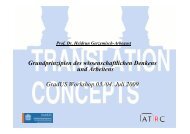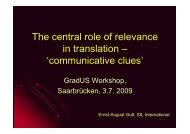Proceedings - Translation Concepts
Proceedings - Translation Concepts
Proceedings - Translation Concepts
Create successful ePaper yourself
Turn your PDF publications into a flip-book with our unique Google optimized e-Paper software.
MuTra 2005 – Challenges of Multidimensional <strong>Translation</strong>: Conference <strong>Proceedings</strong><br />
Minako O’Hagan<br />
The two localization models highlight the characteristic of the localization paradigm<br />
which seeks the equivalent relationship with a comparable local product to retain its “look and<br />
feel” (Fry 2003). With the sim-ship model, the lack of context is often filled in by the<br />
translator’s domain knowledge on video games in general. As such it somewhat diffuses the<br />
power of the source text by replacing it with the translator’s gut feeling of what a game<br />
should look like. In this model the simultaneous availability of the localized versions side by<br />
side with the original could further give the illusion of a localized version being the original<br />
rather than its translation. But this is only when localization is carried out successfully.<br />
Unsuccessful localization may produce games that feel lackluster with players preferring to<br />
go to the original game despite the apparent difficulty in understanding the language<br />
(Chandler 2005). This in turn can be linked to the localizer’s lack of attention to the original<br />
gameplay experience.<br />
The Japanese market specific International version demonstrates the importance of the<br />
“look and feel” of the game as part of a global product while keeping “localness” by creating<br />
a hybrid version. In this model the overall gameplay experience of the original seems not only<br />
to be retained but enhanced with the incorporation of the additional global touch. Although<br />
this model is not representative of game localization on the whole, it provides insight towards<br />
establishing a widely applicable game localization model.<br />
While the general localization principle places an emphasis on the localized version<br />
blending in with locally produced equivalent products, game localization specifically seeks<br />
the game experience of the original version to be conveyed How is this achieved? In order to<br />
further pursue this question, the next section homes in on the translation issues associated<br />
with the localization models.<br />
4 <strong>Translation</strong> issues<br />
This section discusses a number of translation issues that arise from particular localization<br />
models applied to the games domain. The first example is where the English version is used<br />
as a pivot for localizing Japanese games into European versions. Due to the cost implications,<br />
in-game dialogs in Final Fantasy X (FFX) and Final Fantasy X-2 (FFX-2) were only dubbed<br />
into English and this, in turn, served as the basis for subtitles into other European languages<br />
(Mangiron 2004). Using the dubbed version as the source text sometimes creates an issue due<br />
to the liberty already taken in dubbing as this could be mirrored uncritically into the subtitled<br />
versions. For example, in a scene in FFX the last words spoken by the main character Yuna to<br />
her lover Tidus was translated into English as “I love you." in the North American version<br />
from the original Japanese phrase<br />
“(arigato) [thank you]” (Mangiron ibid).<br />
This decision in the American version subsequently caused a reaction among some fans<br />
who considered it out of character for Yuna who had been portrayed as rather reticent.<br />
However, the European translators had no option but to work from the American rendition<br />
since it is the American dubbed version which the players will hear in the European versions<br />
of the game (Mangiron ibid). While the problem of using a pivot language is not a new one<br />
with some Japanese RPG titles in particular part of their appeal lies in their perceived<br />
foreignness to the rest of the world. Games such as the FF series seem to have succeeded in<br />
keeping their delicate balance, being at once familiar and foreign to the target players. This<br />
suggests the need for translation strategies for Japanese games to take into consideration what<br />
to domesticate and what to foreignize and yet such attempts may be undermined by the use of<br />
the pivot language version from which translators have to work.<br />
80
















